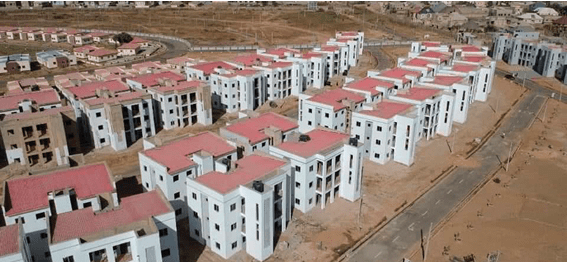Professionals in the housing industry have decried the imposition of multiple taxes on real estate transactions by government.
The latest outburst is not unconnected with fresh directives by the Federal Inland Revenue Service (FIRS) mandating landlords and property agents to charge six per cent on tenancy transactions as Stamp Duty and remit same to FIRS as Stamp Duty Act.
Speaking with New Telegraph on Sunday, many of the real estate practitioners stated that multiplicity of taxes without consideration was getting out of hand.
According to the experts, the six per cent tax on tenancy transaction will have negative impacts on tenants and home seekers at this critical period the nation and families are battling with impact of coronavirus pandemic.
They added that landlords would take advantage of the situation and definitely pass the new tax on to tenants. Existing taxes on real estate investment include Certificate of Occupancy, Governor’s Consent, planning approval, ground rent, Value Added Tax, tenement rates and legal fee. Principal Partner, Ubosi Eleh and Co., Mr.Chudi Ubosi, an estate surveyor and valuer, urged government to shelve the directive, saying there were already ‘too many’ taxes on real estate transactions.
Ubosi said this was not the right time to introduce new taxes when people are grappling with COVID-19 coupled with its negative effects of everyone.
According to him, government should on the other hand be introducing palliatives to make life easier and not harder. He said: “I think the policy should be shelved.
There are already too many taxes on real estate transactions. What the government needs to do is ensure the full compliance of these taxes.
They would make a lot more money. “Spread the tax net wider, bring in more properties, and encourage property owners to process title to their properties so they can free dormant capital.” Ubosi said that the new policy on rent would make it more expensive to let houses as most landlords will pass the new tax to tenants, adding that it would increase litigation between landlord and tenant.
“It may also create a black market whereby landlords will collect some rent in cash and reflect only a little on the lease agreement,” he added.
Chairman, Nigerian Institution of Estate Surveyors and Valuers (NIESV), Lagos State chapter, Mr. Dotun Bamigbola, corroborated Ubosi, saying that imposition of six per cent stamp duty on rent was not encouraging to the economy, which has already stretched finances of the citizenry.
He said: “Don’t forget that a legal fee, which in some cases may be about 10 per cent, will be paid to prepare the lease agreement, before you can affix or pay a stamp duty on it again at six per cent by this regulation.
“That is already 16 per cent of the consideration on a year’s tenancy or lease, just to have a legal document on the transaction. “Let us not forget that recently, FIRS brought up the implementation of VAT at 7.5 per cent on rent and all fees.”
This, Bamigbola said, would escalate these incidental charges and taxes to more than 23.5 per cent of the rent paid on a property. According to him, this would likely create a setback for transactions for the tenants/lessees. He urged government to note that its responsibility was to make life easier for the people at this critical time when all businesses are still trying to find their feet.
Infact, he said that people should be getting tax breaks for the taxes they have paid in the past, seeking a review and reversal of the policy in the interest of the end users and Nigerians.
A former President of International Facilities Management Association, Nigeria Chapter, Pastor Stephen Jagun, also said that multiplicity of taxes without consideration was getting out of hand.
He pointed out that due to multiple taxes, Mr Price, a retail chain from South Africa, had closed all its outlets in Nigeria for this reason. Besides, he stated that the timing for the new policy was entirely wrong, adding that it would portray government as being insensitive to the plight of the people.
He said: “To start with, many tenants are finding it difficult to feed talk less of paying rent. Many have either not been paid wages or lost their jobs or having serious business challenges.
“Unfortunately, government has little to show in infrastructural development and the various scandals of how funds are being siphoned through some government agencies are all over the news.” If government goes ahead with the new tax regime on real estate transactions, Jagun pointed out that non-compliance would be the order of the day. According to him, many transactions in property would end up not being registered.
Source: New Telegraph




